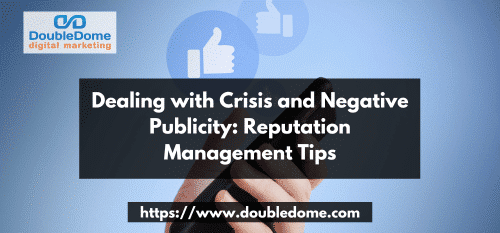Businesses and individuals are susceptible to crisis situations and negative publicity that can quickly tarnish their reputations. The way you handle such incidents can make a significant impact on your brand image and public perception. In this article, we will explore effective reputation management tips to help you navigate through crises and turn negative publicity into an opportunity for growth.

1. Embrace Transparency and Open Communication
Transparency is key when dealing with a crisis. Proactively address the issue by promptly sharing accurate information and updates with your stakeholders. Open communication builds trust and shows that you take responsibility for the situation. Keep the lines of communication open through various channels, such as social media, press releases, and direct customer interactions.
2. Develop a Comprehensive Crisis Management Plan
To effectively manage a crisis, it’s crucial to have a well-defined plan in place. Anticipate potential crises, outline key roles and responsibilities, and establish protocols for communication and decision-making. Your crisis management plan should be regularly reviewed, updated, and shared with relevant team members to ensure preparedness.
3. Monitor and Respond to Online Conversations
In the age of social media, negative publicity can spread rapidly. Implement a robust monitoring system to keep track of online conversations related to your brand. Actively listen to feedback, address concerns promptly, and engage with your audience. By acknowledging and resolving issues publicly, you demonstrate your commitment to customer satisfaction.
4. Engage with Influencers and Brand Advocates
Leverage the power of influencers and brand advocates to rebuild your reputation. Identify individuals who have a positive association with your brand and reach out to them. Encourage them to share their positive experiences and opinions about your products or services. Their endorsement can help counterbalance negative publicity and restore public trust.
5. Utilize Search Engine Optimization (SEO) Strategies
Implementing effective SEO tactics can help push down negative search results and enhance your online reputation. Optimize your website content, meta tags, and headings with relevant keywords related to your brand and industry. Publish high-quality and informative content that addresses common concerns or misconceptions. By doing so, you can control the narrative and ensure positive information ranks higher in search engine results.
6. Leverage Online Reputation Management Tools
Numerous online reputation management tools can assist you in monitoring and controlling your online presence. These tools provide insights into what people are saying about your brand and help you track sentiment analysis. Some popular tools include Google Alerts, Brand24, and Mention. Utilize these tools to stay informed and take proactive measures when needed.
7. Seek Professional Assistance
Sometimes, reputation crises require professional expertise to navigate successfully. Consider engaging the services of a reputation management agency or a PR firm experienced in handling crisis situations. These professionals have the necessary skills and resources to devise effective strategies tailored to your specific needs.
Conclusion
Dealing with crisis and negative publicity is an inevitable part of running a business or maintaining a personal brand. By embracing transparency, developing a comprehensive crisis management plan, monitoring online conversations, engaging with influencers and brand advocates, utilizing SEO strategies, leveraging online reputation management tips and tools, and seeking professional assistance when required, you can effectively manage your reputation and come out stronger from challenging situations.
FAQs (Frequently Asked Questions)
How long does it take to recover from a reputation crisis?
Recovering from a reputation crisis varies depending on the severity of the situation and the actions taken. It can take weeks, months, or even longer to rebuild trust and restore your reputation fully.
Can negative publicity be turned into a positive opportunity?
Yes, negative publicity can be turned into a positive opportunity by handling it transparently, addressing concerns, and showcasing improvements. By demonstrating your commitment to resolving issues, you can win back trust and strengthen your reputation.
Should I respond to negative comments on social media?
It is essential to respond to negative comments on social media promptly and professionally. Ignoring or deleting them can further escalate the situation. Engage with the individuals privately if possible and publicly show your dedication to resolving the issue.
How can SEO help in managing reputation?
SEO helps manage reputation by optimizing online content to rank higher in search engine results. By strategically incorporating relevant keywords and publishing positive content, you can push down negative search results and shape the narrative around your brand.
When should I consider hiring a reputation management agency?
Consider hiring a reputation management agency when you face a severe crisis that requires specialized expertise and resources. They can provide guidance, develop effective strategies, and execute a comprehensive plan to manage and rebuild your reputation.








